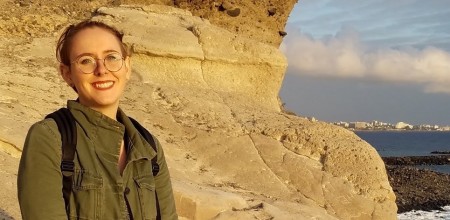Seminar
Relating First-person and Third-person Videos
Abstract: Thanks to the availability and increasing popularity of wearable devices such as GoPro cameras, smart phones and glasses, we have access to a plethora of videos captured from the first person perspective. Capturing the world from the perspective of one's self, egocentric videos bear characteristics distinct from the more traditional third-person (exocentric) videos. In [...]
Carnegie Mellon University
Learning Reactive Flight Control Policies: from LIDAR measurements to Actions
Abstract The end goal of a reactive flight control pipeline is to output control commands based on local sensor inputs. Classical state estimation and control algorithms break down this problem by first estimating the robot’s velocity and then computing a roll and pitch command based on that velocity. However, this approach is not robust in [...]
Carnegie Mellon University
Autonomous 3D Reconstruction in Underwater Unstructured Scenes
Abstract Reconstruction of marine structures such as pilings underneath piers presents a plethora of interesting challenges. It is one of those tasks better suited to a robot due to harsh underwater environments. Underwater reconstruction typically involves human operators remotely controlling the robot to predetermined way-points based on some prior knowledge of the location and model [...]
Carnegie Mellon University
Wire Detection, Reconstruction, and Avoidance for Unmanned Aerial Vehicles
Abstract Thin objects, such as wires and power lines are one of the most challenging obstacles to detect and avoid for UAVs, and are a cause of numerous accidents each year. This thesis makes contributions in three areas of this domain: wire segmentation, reconstruction, and avoidance. Pixelwise wire detection can be framed as a binary [...]
Carnegie Mellon University
Toward Invariant Visual Inertial State Estimation using Information Sparsification
Abstract In this work, we address two current challenges in real-time visual-inertial odometry (VIO) systems - efficiency and accuracy. To this end, we present a novel approach to tightly couple visual and inertial measurements in a fixed-lag VIO framework using information sparsification. To bound computational complexity, fixed-lag smoothers perform marginalization of variables but consequently deteriorate accuracy and [...]
Imaging the World One Photon at a Time
Abstract: The heart of a camera and one of the pillars for computer vision is the digital photodetector, a device that forms images by collecting billions of photons traveling through the physical world and into the lens of a camera. While the photodetectors used by cellphones or professional DSLR cameras are designed to aggregate as [...]
Carnegie Mellon University
Lesson Learned from Two Decades of Robotics Development and Thoughts on Where We Go from Here
Abstract: In this talk, Herman Herman will offer various lessons learned from developing various robots for the last 2 decades at the National Robotics Engineering Center. He will also offer his perspective on the future of autonomous robots in various industries, including self-driving cars, material handling and consumer robotics. Bio: Dr. Herman Herman is the [...]
Factor Graphs for Robot Perception
Abstract: Factor graphs have become a popular tool for modeling robot perception problems. Not only can they model the bipartite relationship between sensor measurements and variables of interest for inference, but they have also been instrumental in devising novel inference algorithms that exploit the spatial and temporal structure inherent in these problems. I will overview [...]
Towards better methods of video generation
Abstract: Learning to generate future frames of a video sequence is a challenging research problem with great relevance to reinforcement learning, planning and robotics. Existing approaches either fail to capture the full distribution of outcomes, or yield blurry generations, or both. In this talk I will address two important aspects of video generations: (i) what [...]
Light-Sensitive Displays
Abstract: Nobel prize winner M. G. Lippmann described his dream of an ideal display as a “window into the world.” “While the current most perfect photographic print only shows one aspect of reality, reduced to a single image fixed in a plane, the direct view of reality offers, as we know, infinitely more variety.” Changing [...]









